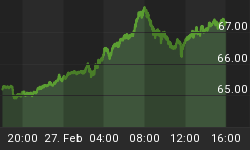The past couple weeks have seen a strong pullback in both commodity prices and stocks. Gold fell sharply off its peak after soaring just past $1,900. Volatility in commodity, currency, and equity markets has been very high recently, and these short-term price movements have Wall Street pundits in an uproar.
As gold prices soared, many advisors recommended investing in the yellow metal with appeals to the "bandwagon effect". A rising price, they argued, indicated changing sentiment, and thus future appreciation. For those who bought on this reasoning, a falling price is a bad omen.
In addition, for a while, gold prices were rising even as stock prices were falling. As a result, some investors bought gold to hedge stock market risk. When gold eventually followed equity prices lower, these trades were unwound.
But as my readers know, following the crowd has never been the reason to buy gold. After all, that same logic would have recommended buying a house in Phoenix five years ago. Since the fundamentals still point to gold's long-term viability, our phones have been ringing off the hook with customers smartly seeking to take advantage of the dip.
Unchanging Fundamentals
It's important to understand the fundamental reasons for owning gold, and those reasons have not changed. The US government embarked on a decades-long spending spree of historic proportions. To finance the resulting debt, the Federal Reserve is printing money furiously. Because most every central bank governor appears indoctrinated in the Keynesian economic philosophy, foreign central banks are simultaneously printing euros, yen, francs, yuan, and pounds to "keep up." Of course, this competitive devaluation actually represents countries shooting themselves in the foot.
Don't expect any abrupt changes either. The Fed's philosophy - a resolute faith in central planning and debasement - has been unchanged since Paul Volcker stepped down as Chairman in 1987.
Rather than considering any change of direction, the Federal Reserve Board is likely asking itself: "Should we print $50 billion or $500 billion in our next round of stimulus?" "Can the ECB bailout Greece now or do we first need to bail out the ECB?" "Should we call our money-printing'liquidity assistance' or 'quantitative easing'?"Or perhaps, "Do we have enough ink refills for all those printing presses?"
You may think I'm joking, but this is quite serious. While monetary policy was bad under Greenspan, Ben Bernanke has literally instituted a revolutionary devaluation program for the dollar. And gold is the only way to avoid his guillotine.
True Value vs. Spot Price
Let's remember that it is the fundamental value of an asset which dictates its long-term market price. Yet for some reason, many see this relationship backwards - they use the short-term market price to extrapolate the fundamental value. Consider a car on the dealer's lot: if the price of the car falls tomorrow, it becomes a better deal. If the price rises tomorrow, the car has becomes less attractive.
This principle is equally true in long-term investments. I believe that gold's fundamental value is far higher than $1,600, and far higher than $2,000. So, while it may be unsettling for some of those who own gold to see steep short-term price declines, remember to focus on the fundamental value of the asset, not the spot price on the market today.
Has the fundamental value of gold fallen in these past two weeks? Quite the opposite.
A Debt-Laden House of Cards
The Fed is still trying to find ways to manipulate the bond market with the newly announced "Operation Twist." This is yet another plan to suppress yields, encourage spending (as if too little spending was America's problem), and paper-over the untenable interest payments hanging over Washington. The manipulated US bond market is perhaps the greatest bubble in existence. Further manipulation only makes it more unstable in the long-term, and when that bubble bursts, gold should skyrocket.
Meanwhile, the European debt crisis is quickly spreading to Italy. On Sept. 28th, Italy was selling bonds at yields twice as high as the previous sale at the beginning of the year. The ECB may be able to keep Greece afloat, but Italy is the eurozone's third largest member. That's a load too heavy for the ECB to bear.
This is especially true in the wake of Moody's downgrade of two of the largest French banks - Societe Generale and Credit Agricole. As reported in the Wall Street Journal, "[Moody's] said its decision to downgrade the banks included the assumption of debt restructuring that would cost investors up to 60% on Greek sovereign debt, 50% on Portuguese and Irish debts, 10% on Spanish debt and 7% on Italy's debt."
In other words, the Western financial system is a debt-laden house of cards. This is the root of the current market panic. But what's harder to explain is why investors are responding by selling gold and buying dollars and euros. Then again, I was always told not to look a gift horse in the mouth.
Keep Calm and Carry On
Do not get caught in the exuberance or pessimism of short-term movements, even if they're sharp. Observe the fundamentals - the events in Europe, the looming budget calamity in the US, central bankers' steadfast strategy of debasement, and emerging markets' continued diversification into precious metals. These are the main drivers for gold's long-term appreciation.
To my readers who may have purchased metals just before this pullback, your concern is understandable. But I believe this bull market has a long way to run, and the rise up ahead looks even steeper from these levels.
Peter Schiff is CEO of Euro Pacific Precious Metals, a gold and silver dealer selling reputable, well-known bullion coins and bars at competitive prices. To learn more, please visit www.europacmetals.com or call (888) GOLD-160.
For the latest gold market news and analysis, sign up for Peter Schiff's Gold Report, a monthly newsletter featuring original contributions from Peter Schiff, Casey Research, and the Aden Sisters. Click here to learn more.















